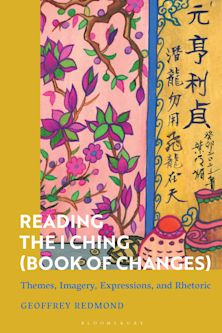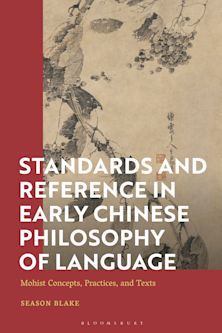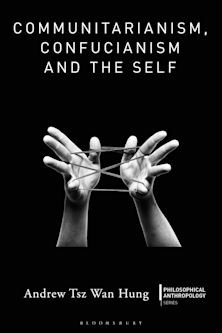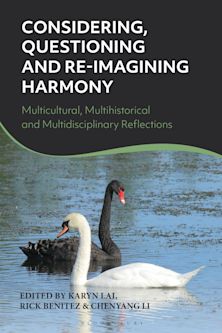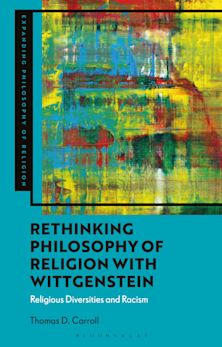- Home
- ACADEMIC
- Philosophy
- Chinese Philosophy
- Confucius
Exam copy added to basket
Choose your preferred format. Please note ebook exam copies are fulfilled by VitalSource™.
Buy from Bloomsbury eTextBooks
You are now leaving the Bloomsbury Publishing website. Your eBook purchase will be with our partner https://www.vitalsource.com.
Your credit card statement will show this purchase originating from VitalSource Technologies. They will also provide any technical assistance you might require.
You must sign in to add this item to your wishlist. Please sign in or create an account
Description
Through a systematic introduction of Confucius as a historical figure, a spiritual leader, a philosopher, a political reformer, an educator, and a person, this book offers a comprehensive, lucid, and in-depth articulation of Confucius and his teachings for Western students. It explains how his ideas are different from their Western counterparts as well as challenging the orthodox Western understandings of Confucianism. The book reveals clearly how Confucius’s insights can be a rich resource for addressing contemporary problems and re-enchanting the world and the contemporary life.
Table of Contents
Chronology
Chapter I. Confucius as a Historical Figure
Long, Long Ago, There Was a Time
A Man from a Humble Background
The Life Story Continues …
The Second Epoch
New Challenges and the Third Epoch
Chapter II. Confucius as a Spiritual Leader
A Wooden Bell-Clapper
Humans are Part of Heaven
Mandate and Destiny
Immortality and the Meaning of Life
Inter-religiosity
Chapter III. Confucius as a Philosopher
One Cannot Be Fully a Human in Solitude
Born to Become a Human
What Makes A Vessel Sacred?
Naming Means Illuminating
Hit the Mark Constantly
Chapter IV. Confucius as a Political Reformer
Ideal Society—Harmony and Holism
Sageliness Within and Kingliness Without
Names and Rituals as Political Devices
The Freedom of Needing No Choice
Uprightness and Justice
Chapter V. Confucius as an Educator
The Kind of Education
Six Arts
Learning, Thinking, and Embodiment
Method of Education
Chapter VI. Confucius as a Person
The “ZENG Dian Spirit”
Elitist?
Sexist?
Honesty and Sincerity
After All, the Master Is a Human
Bibliography
Index of Quotes from the Analects
Index of Names and Subjects
Product details
| Published | Feb 18 2016 |
|---|---|
| Format | Ebook (Epub & Mobi) |
| Edition | 1st |
| Extent | 190 |
| ISBN | 9781442257436 |
| Imprint | Rowman & Littlefield Publishers |
| Publisher | Bloomsbury Publishing |
Reviews
-
In this thematic, well-written portrait, Confucius is less an authoritarian, ultra-stern traditionalist concerned with squeezing everything into a rigid theoretical role and ritual structure and more a thoughtful guide to each individual’s unique spiritual and ethical life, a life in which ritual and role mostly set the table for a life ending in mastery, or gongfu. Ni's emphasis on a truly important side of Confucius’s philosophy is interesting, and he offers some thoughtful, innovative takes on Confucius’s philosophy. This approach also allows the author to defend Confucius from common criticisms and even allows opposing later Confucians Mencius and Xunzi. Focusing on gongfu helps keep individuals from reducing Confucian thought into their own deontological/consequentialist principle-oriented frameworks…. [T]his is an interesting text with insightful passages and challenging interpretations worth pondering.
Summing Up: Recommended. Upper-division undergraduates through faculty and professionals.Choice Reviews
-
“The book is a thoughtful and inspiring presentation of Confucianism as arguably the longest and most influential ethical and spiritual traditions in human history. It is highly readable with many insightful observations. Especially noteworthy is its emphasis on self-cultivation, spiritual exercises, and learning of the heart-and-mind as essential features of Confucian humanism in the 21st century.”
Tu Weiming, Director of the Institute for Advanced Humanistic Studies at Peking University, Distinguished Researcher in the Asian Center at Harvard University
-
“Peimin Ni has provided a portrait of Confucius that makes him more complex and also more human than he generally is presented as being.”
Joel Kupperman, University of Connecticut
-
Ni Peimin’s book shifts attention from considering Confucius as a theorist to reading him as a guide to the art of living, or to life as an aesthetic endeavor. Confucius is masterfully constructed as an interrelated whole, while at the same time, parts can be selected for discussion or a short read, without a need to link them to other parts. The sections are accurate in their biographical and historical details, while teaching that art of living. In both music and society, harmony works longer if it is a blend of differing voices than if it is the conformity of all instruments or voices sounding (thinking) the same. There is harmony in variety. In the section on secular immortality, Confucius and Ni ask us to consider one kind of immortality as the lasting impact of virtuous exemplars, whom they describe, on their communities and larger social groups. Throughout the book there are insightful comparisons with relevant Western figures. For example, the goal of the Jesuit missionary Matteo Ricci (1552-1610) was to learn 'What should I believe is true?' The Confucian goal was to learn 'how to live one’s life in this world.'
Donald Munro, University of Michigan
-
In this remarkable book, Peimin Ni presents a systematic interpretation of Confucius from a gongfu perspective and invites readers to appreciate the Confucian ethical life in artistic, rather than theoretical, terms. Thus understood, Confucius’s teachings ultimately are aimed not at setting up moral principles and rules to constrain people, but at providing guidance to enable people to lead the good life. This book provides readers a refreshing view of Confucius and his philosophy. It makes an excellent reading for scholarly exploration as well as in the classroom.
Chenyang Li, author of Reshaping Confucianism: A Progressive Inquiry
-
Peimin Ni’s eloquent new book is an ideal introduction to Confucius and Confucianism. The book ranges from early stories to modern history, but is centered throughout on the Analects, our best source for Confucius’s teachings. Professor Ni gives us a sympathetic and engaging treatment of Confucius as person, thinker, and teacher, and makes clear why Confucius’s values, life story, and ideas have been so inspiring.
Stephen C. Angle, Professor of Philosophy and East Asian Studies, Wesleyan University











